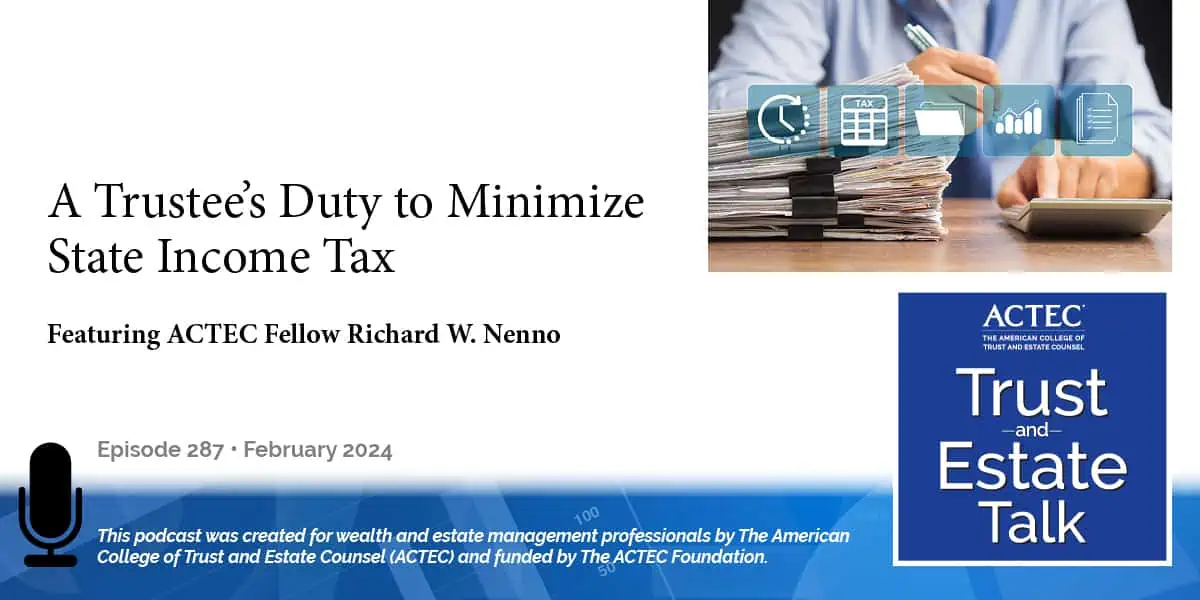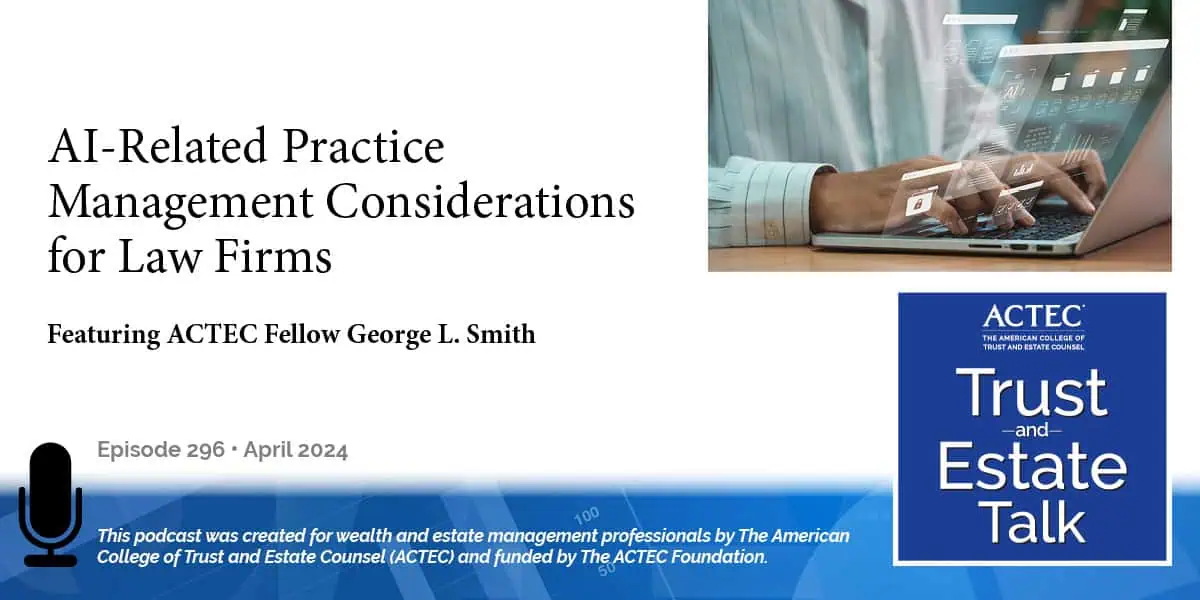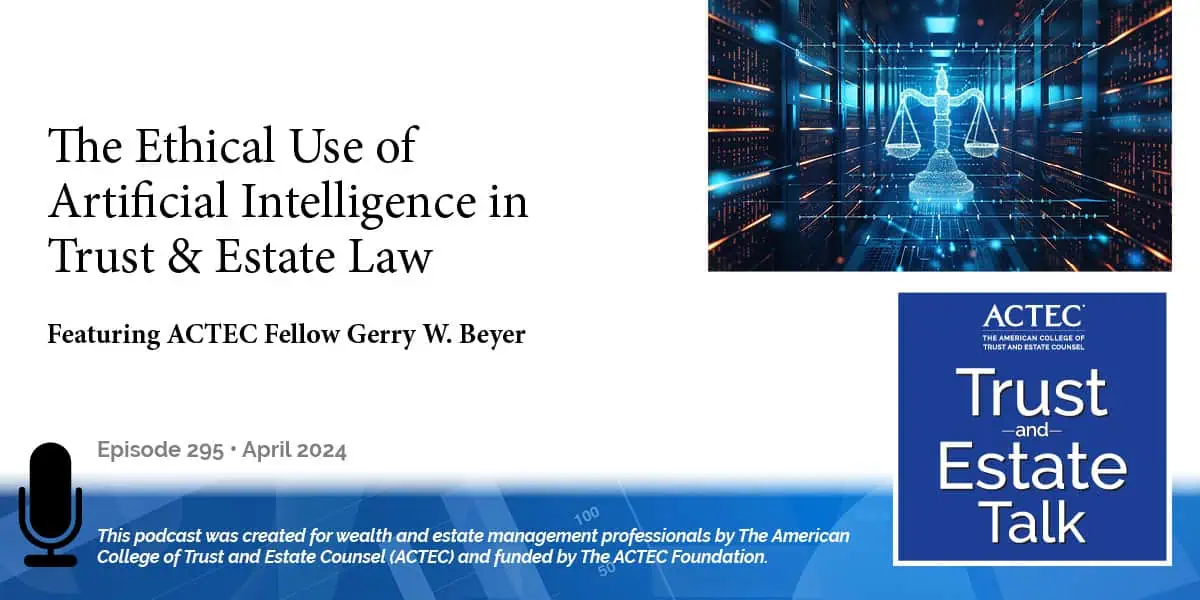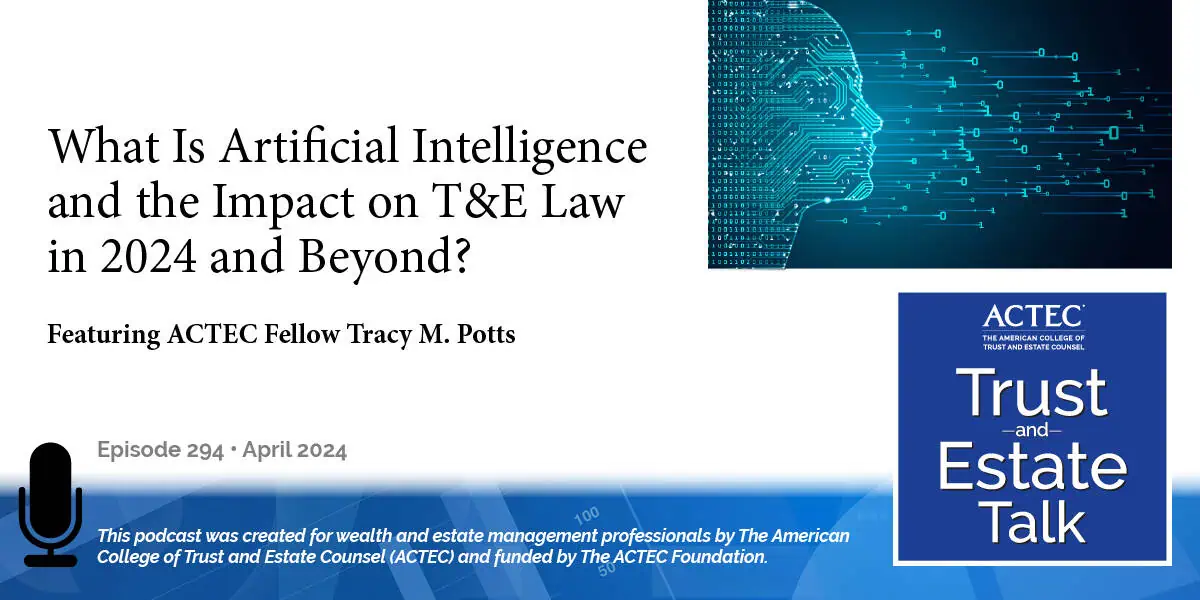A Trustee’s Duty to Minimize State Income Tax

“A Trustee’s Duty to Minimize State Income Tax,” that’s the subject of today’s ACTEC Trust and Estate Talk.
Transcript/Show Notes
This is Travis Hayes, ACTEC Fellow from Naples, Florida. Trustees have legal and ethical responsibilities when managing trusts. Today, we will delve into the fiduciary duty of trustees to employ strategies and make decisions that align with the goal of reducing tax burdens within the framework of applicable state laws and regulations. ACTEC Fellow Dick Nenno, of Wilmington, Delaware, joins us to break down this topic and offer recommendations to estate planning professionals. Welcome, Dick.
Legal Considerations
Thank you, Travis. Hello, everyone. Section 108(b) of the Uniform Trust Code says that: “A trustee is under a continuing duty to administer the trust at a place appropriate to its purposes, its administration, and the interests of the beneficiaries.”
Some speakers at this year’s Heckerling Institute asserted that the factors which trustees must consider to fulfill this duty don’t include the minimization of state income taxes. I don’t think that’s right for the legal, practical, and moral reasons that I’ll touch on today.
I should mention that Vince Thomas, who is also an ACTEC Fellow, and Travis Maurer have an article in the December (2023) issue of Trust and Estates Magazine that goes through this topic and gives citations. So, you might want to look at that for the background of what I’m talking about today.
Uniform Trust Code Section 108(b)
Turning to the legal reasons why trustees should minimize state income taxes on trusts – at the moment, 23 of the 36 jurisdictions that have adopted the UTC enacted Section 108(b) verbatim. And I should mention there are 35 states and the District of Columbia that have enacted some form of the Uniform Trust Code. I’m going to sweep D.C. into the term “state” today, so I’ll be talking about 36 states, but understand that D.C.’s one of the states.
Modifications and Omissions in State Adaptations
Six states have modified versions of Section 108(b). For example, Alabama added the following language to its version of Section 108(b). “Provided, however, that a trustee shall not be required to transfer the trust principal place of administration to another state or to a jurisdiction outside of the United States.” The Alabama comment explains: “Alabama amends the language of subsections B and C in the UTC by giving the trustee the authority, but without imposing an affirmative duty to transfer the trust’s principal place of administration where appropriate. The original UTC language seems to impose an affirmative duty upon the trustee to seek the best place of administration for the trust. The original language could be interpreted to require the trustee to continually forum shop for, among other things, the best tax situs for the trust and the best tax situs for the beneficiaries. Transferring the trust’s principal place of administration is costly and time-consuming and should not be undertaken lightly and without considering all of the relevant factors, the trust’s purposes, the trust’s interests, and the interests of the beneficiaries.”
Two comments about Alabama. First, the Alabama drafters certainly considered state income tax as a factor and perhaps the principal factor under Section 108(b). Second, transferring the principal place of administration is not necessarily costly and time-consuming using procedures contained in the UTC.
Mississippi added similar language to its version of Section 108(b). Seven states omitted Section 108(b) altogether from their versions of the Uniform Trust Code.
The Pennsylvania drafters said: “UTC Section 108(b) is omitted to avoid the implication of a duty that the trustee consider the laws of all conceivable jurisdictions to which the situs of a trust may be moved and establish and re-establish situs accordingly.”
At least on this issue, the trustee only needs to know the law of two states, Pennsylvania and how to escape its tax, and one other state where the trust won’t be taxed. It’s generally known that Alaska, Florida, Nevada, South Dakota, Texas, and Wyoming don’t have income taxes and that Delaware won’t tax the trust or require the trustee to file a return if the trust has no Delaware resident beneficiaries.
Beneficiary-Centric Focus
The drafters of UTC Section 108(b) certainly were thinking of the state income taxes. The UTC comment to Section 108 lists six factors that trustees should evaluate to satisfy their duty to administer a trust in an appropriate jurisdiction:
- The court that has jurisdiction over the trust.
- The law that governs the trust.
- The location of the trustees and the beneficiaries.
- The appointment of a new trustee.
- The change of location of trust investments.
- State income tax, which is mentioned twice.
The Trust and Estate Magazine’s article that I mentioned summarizes a recent Illinois General Information Letter where the trustee was concerned about state income tax under Illinois’ version of Section 108(b).
UTC Section 108(b) does require a trustee to select a jurisdiction that serves the interests of the beneficiaries, not the interests of the trustees or of the state taxing authorities. UTC Section 103(8) defines the interests of the beneficiaries as: “the beneficial interests provided in the terms of the trust.” 35 of the 36 UTC states have a comparable definition. At least four other UTC provisions require the trustee to focus on the interests of the beneficiaries.
Practical Implications
Section 404, which is in effect in 30 of the 36 UTC states, provides that a trust must be for the benefit of the beneficiaries. UTC Section 801 is in effect in 34 of the 36 UTC states. It requires trustees to administer trusts in the interests of the beneficiaries. UTC Section 802(a), which is in effect in 35 of the 36 UTC states, requires trustees to administer trusts solely in the interests of the beneficiaries. Finally, UTC Section 814(a) is in 28 of the 36 UTC states; it requires trustees to exercise discretionary powers in the interests of the beneficiaries.
As I’ve said, there are 36 UTC states. Two states – Alaska and Idaho – have statutes based on Section 7-305 of the Uniform Probate Code, which is similar to UTC Section 108(b). Indiana has a stand-alone statute to the same effect. Trustees in the six states that have modified versions of the UTC Section 108(b), the seven states that dropped UTC Section 108(b), and the 12 states – including New York and California – that don’t have a relevant statute, can’t relax. That’s because Comment B2, under Section 76 of the Third Restatement of Trust, says, “[A] trustee’s duty to administer a trust includes an initial and continuing duty to administer it at a location that is reasonably suitable to the purposes of the trust, is sound and efficient administration, and the interests of its beneficiaries.”
Win-Win Proposition
The reporter’s notes to Section 76 quote the UTC comment that I mentioned earlier. So, in my view, trustees in all 50 states and the District of Columbia have a continuing duty to try to minimize state income taxes. There are practical considerations as well. Reducing state income taxes is a win-win proposition for the beneficiaries and the trustee. If planning can save $100,000 of California or New York income tax on a $1 million capital gain, there will be $100,000 (and future earnings on it) more for the beneficiaries, and $100,000 (and the future earnings on it) more to improve the trustee’s performance.
Local Advisors and Tax Optimization
Alternatively, the failure to save that tax can provide measurable damages for angry beneficiaries. A practitioner told me that her client’s desire to have local advisors outweighed their interest in reducing state income taxes. Achieving both goals is possible in some circumstances. For example, in Louisiana, an inter vivos trust may have local advisors and escape Louisiana income tax simply by providing that the law of a state other than Louisiana governs the trust.
Moral Imperatives
In the end, I believe there’s a moral duty in this situation. Planning to minimize state income taxes on a non-grantor trust at the outset and throughout the trust administration simply is the right thing to do. I’d like to flesh out this discussion for non-UTC states, so I’d really appreciate it if any of you could direct me to your state’s equivalence of UTC sections 108(b), 404, 801, 802(a), and/or 814(a). Thank you for your attention.
Travis Hayes: Thank you, Dick, for joining us today to discuss the duty of trustees to minimize state income taxes.
Also may also be interested in:
- Lessons From Lisa Marie Presley’s Estate: Why Use a Corporate Trustee (Mar 2023)
- Lawyers as Trustees (May 2019)
Latest ACTEC Trust and Estate Talk Podcasts

AI-Related Practice Management Considerations for Law Firms
A discussion for law firms about how to incorporate AI in their practice management, including staff considerations, the “billable hour,” and more.

The Ethical Use of Artificial Intelligence in Trust & Estate Law
A law professor offers insights into the risks, rewards, duties and ethical considerations of lawyers using AI in their T&E practices.

What Is Artificial Intelligence and the Impact on T&E Law in 2024 and Beyond?
A primer on the types and uses of AI, then a deeper dive into the impact on trust and estate law from types to applications to ethical considerations.

